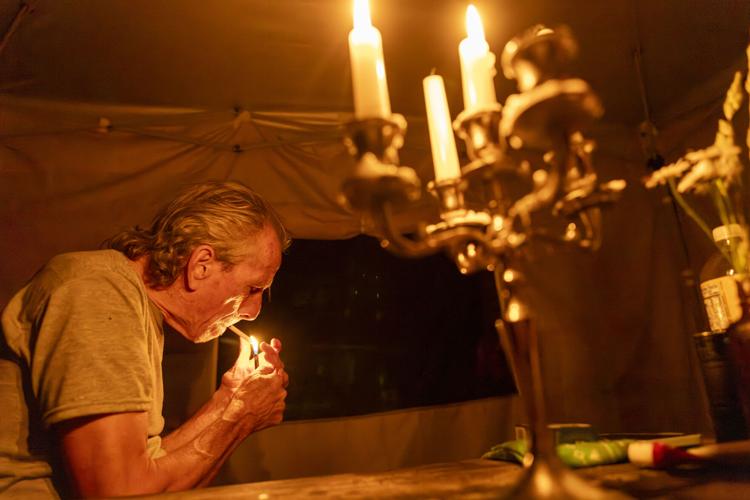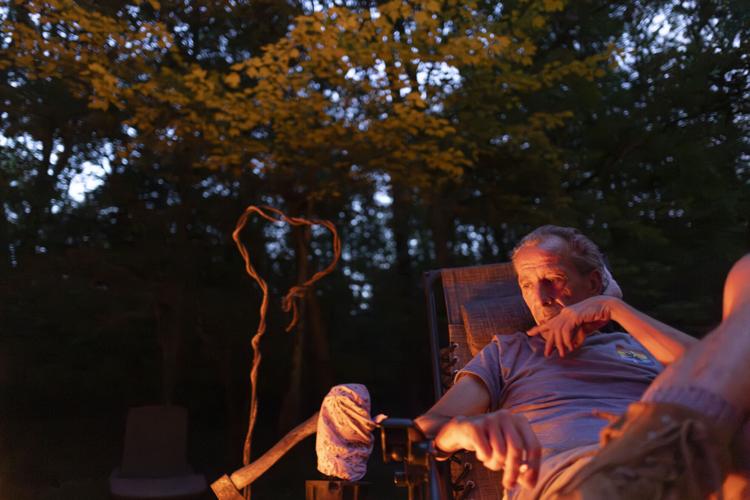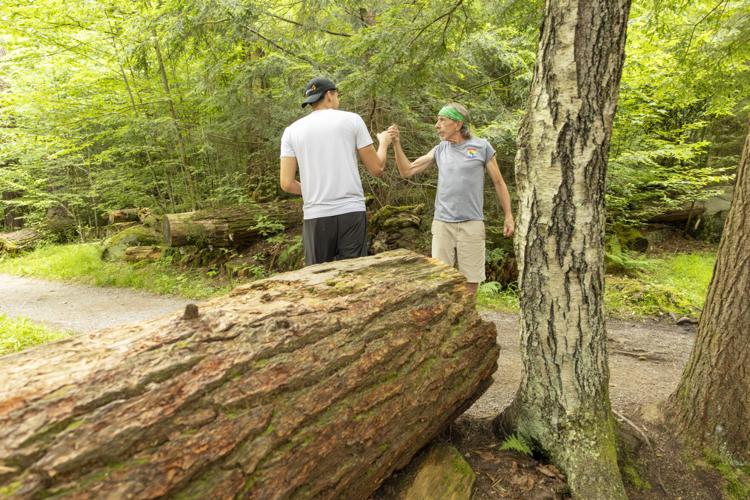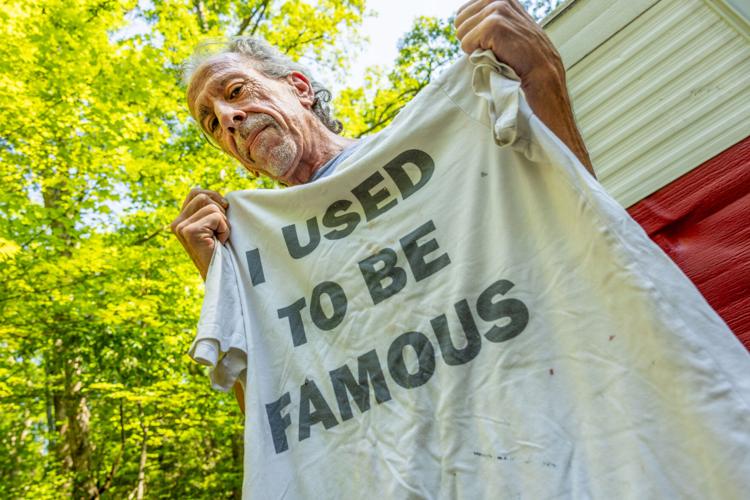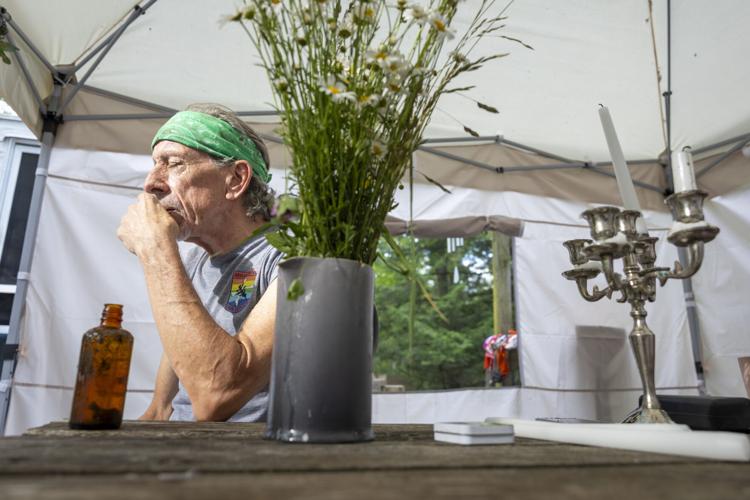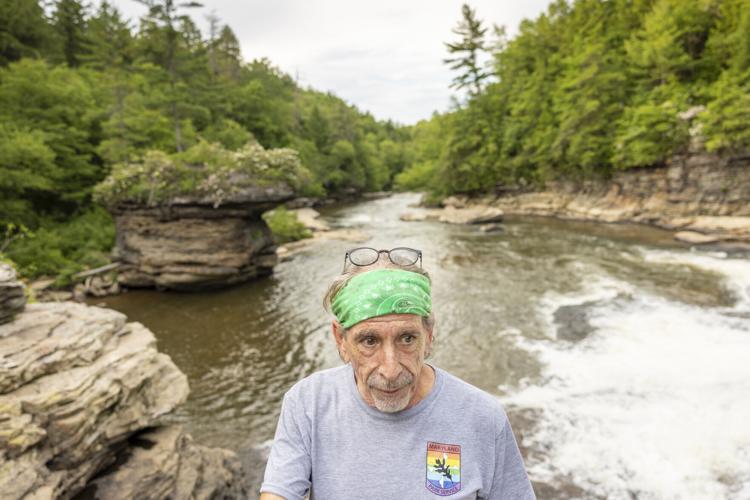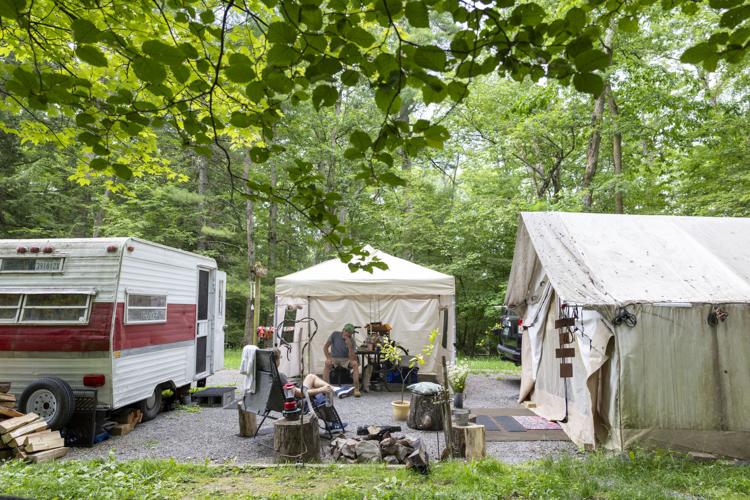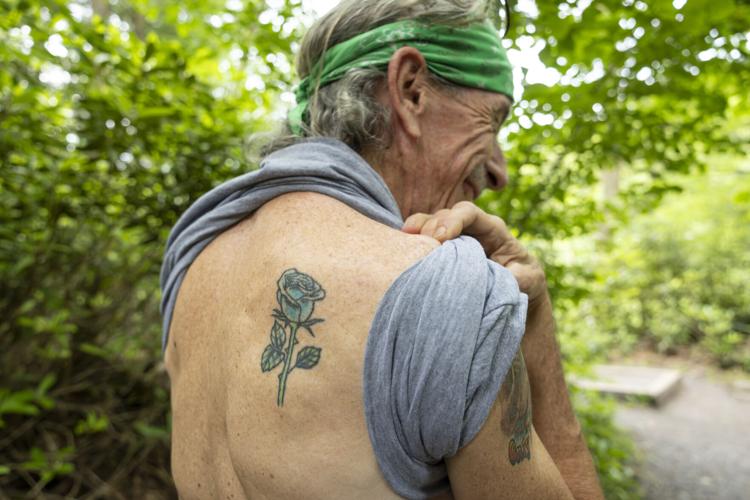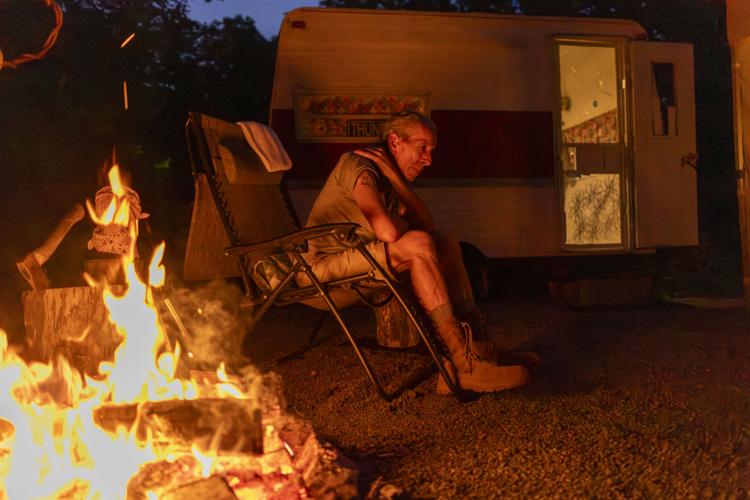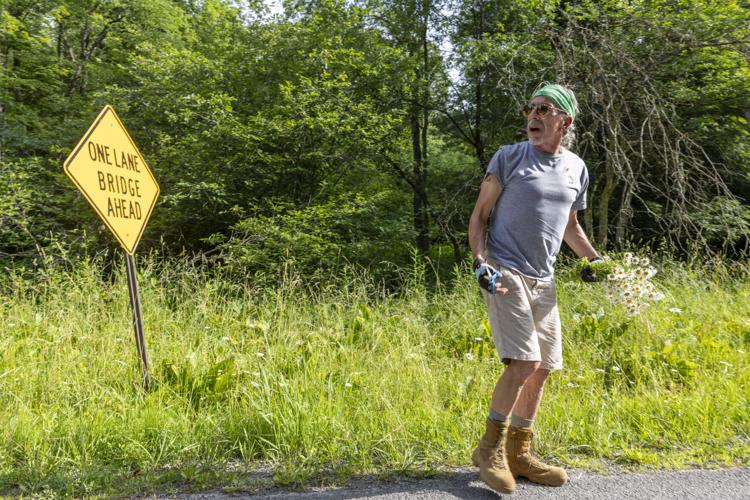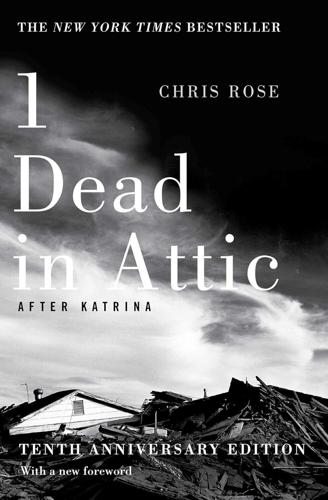Shirtless and soaking, Chris Rose clears the waterfall’s cascade and wipes his eyes, unable to stifle a smile.
He is happy, and he is home.
He lives alone here in Swallow Falls State Park, a wooded enclave of soaring hemlocks, prehistoric-looking rhododendrons and rocky creeks in the mountains of western Maryland.
Come fall, he’ll pack up his well-worn tent and camper for his annual southern migration to an even more remote national forest in Mississippi.
These days, solitude suits him.
In the immediate aftermath of Hurricane Katrina, Rose’s column in The Times-Picayune gave voice to the grief, frustration, anger and absurdity of a battered New Orleans. He filed front-line dispatches from broken streets and his own frayed psyche, eventually collecting those dispatches in the best-selling book “1 Dead in Attic.”

Former Times-Picayune writer Chris Rose passes through a cascading waterfall at Swallow Falls State Park in Maryland on Thursday, June 26, 2025. He first visited the park as a teenager and now lives there for half of the year as a 'camp host.' (Photo by Chris Granger, The Times-Picayune)
Even as he shouldered the burden of a city’s collective trauma — thousands of readers reached out to him — he was bedeviled by alcohol, depression, anxiety and an addiction to prescription painkillers.
He left the paper in 2009, then bounced around to other local media outlets. He hosted a French Quarter walking tour. He waited tables. And he drank — a lot.
In 2021, following multiple hospitalizations and a near-fatal crisis in a Kenner motel, he was diagnosed with end-stage cirrhosis. He’d nearly succeeded in drinking himself to death.
Faced with mortality, he disappeared. He says he quit booze, quit writing and retreated to the Maryland woods and waterfalls that first enchanted him as a teenager.
In Katrina terms, he stripped his life down to the studs.
He’s not sure how much he’s inclined to rebuild.
“These have been the best three-and-a-half years of my life,” he says of his time in the wilderness. “Unequivocally.”
The quiet and clarity have allowed him to reflect on his many highs and lows.
“I’ve sown a lot of beautiful chaos,” he says. “And a lot of it not so beautiful.”

Former Times-Picayune writer Chris Rose walks along a roadway collecting wildflowers near Swallow Falls State Park in Maryland on Wednesday, June 25, 2025. (Photo by Chris Granger, The Times-Picayune)
Owls, bears, snakes
An unseasonably warm afternoon in late June finds a sweaty Chris Rose clipping roadside wildflowers near the entrance to Swallow Falls State Park.
The lines on his face are deep, but he otherwise presents as a relatively healthy and energetic 65-year-old.
Pot gummies, legal in Maryland, help take the edge off his anxiety. “If I had known about that 30 years ago,” he says, “I wouldn’t be dying of cirrhosis.”
He still smokes cigarettes, a habit he acquired as an extra in Oliver Stone’s New Orleans-shot “JFK.”
Of all his addictions, “the hardest to kick has been news,” he says. “When you spend 35 years in the news business, it’s really hard.”
He is Swallow Falls' “camp host,” a volunteer position that allows him to stay for months in exchange for cleaning campsites, answering visitors’ questions and otherwise making himself useful.
He sees his primary duty as “protecting wildlife and trees from the depredations of my fellow human beings.” He’s also a “craftsman with a rake.”

Former Times-Picayune writer Chris Rose, center, chats with a visitor to his campsite at Swallow Falls State Park in Maryland on Wednesday, June 25, 2025. (Photo by Chris Granger, The Times-Picayune)
Swallow Falls has 65 campsites; his has electricity. His red and white camper, which he pulls behind his Toyota 4Runner to and from Mississippi, contains a dorm-sized refrigerator and a microwave. He lives “like a pioneer — a pioneer with a vacuum cleaner and a French press.”
He usually sleeps in a weathered 12’ by 14’ White Duck tent furnished with an inflatable mattress, a lamp, a bookshelf and a flea market end table.
Owls swoop overhead. Not long ago, he and a bear startled one another. He keeps his campsite tidy, in part, so snakes stay away.
“This life is not easy, but it’s simple,” he says. “I have everything I need and I don’t need anything I don’t have.”
He visits New Orleans in the winter while based at Clear Springs Campground inside Mississippi’s Homochitto National Forest. But he doubts he’ll ever live in a city again.
“I don’t function particularly well on concrete anymore. I always have a smile on my face when I’m driving back to the woods.”
A fateful spring break in N.O.
His current circumstances are the opposite of his privileged upbringing three hours east of the park in Chevy Chase, Maryland.
His father, Dr. John C. Rose, pioneered diagnostic cardiology techniques and was dean of Georgetown University’s School of Medicine. His mother, Dorothy, was a graduate of Georgetown’s nursing school. They were married 65 years and raised five children.

Former Times-Picayune columnist and writer Chris Rose at Swallow Falls State Park in Maryland on Wednesday, June 25, 2025. (Photo by Chris Granger, The Times-Picayune)
Christopher — he hated being teased as “Christopher Robin” as a boy — attended Georgetown Preparatory School, a Jesuit institution in suburban Washington D.C. that was founded in 1789 and counts Supreme Court Justices and the current Federal Reserve chair as alumni. Rose smoked joints on the school’s nine-hole golf course between classes.
As a University of Wisconsin journalism major in 1980, he and a buddy road tripped to Texas for spring break. A storm chased them to Florida, then New Orleans. The duo’s one night stand involved Bourbon Street, booze, jazz and, as Rose later wrote, “these beautiful Scandinavian girls.”
After graduating, he landed a job in the Washington Post mailroom. A baseball player, he pitched an idea for a first-person narrative about trying out for the Pittsburgh Pirates.

The cover of the tenth anniversary edition of "1 Dead in Attic," Chris Rose's best-selling collection of his post-Hurricane Katrina columns for The Times-Picayune.
The story scored him his first Post byline. In 1984, he took a job as a crime reporter in The Times-Picayune’s West Bank Bureau. He eventually transitioned to writing features and columns for the Living section.
He was often a character in his own stories. He infamously wrote that Kentwood native Britney Spears “put the ‘ho’ in Tangipahoa.”
He was all-in, all the time, the way naturalized New Orleanians often are, fully immersed in second-lines, Jazz Fest and Mardi Gras alongside his wife, Kelly, and their three children.
Katrina changed everything.
Finding fame
The week before the storm, Rose covered a “naked sushi party” where raw fish was plucked off a model’s body. He also interviewed actress Lucy Lawless at the West End restaurant Bruning's.
Days later, Bruning's was in the lake and Rose’s days as a celebrity stalker were done.
He rode shotgun as the city clawed its way back. For returning residents and far-flung exiles, he was essential, emotional reading.
A self-published collection of his post-Katrina columns sold 65,000 copies. Simon & Schuster took notice and, in 2007, released an expanded edition of “1 Dead in Attic” that became a New York Times bestseller.

Former Times-Picayune writer Chris Rose shows his "I Used to Be Famous" t-shirt, which was given to him as a gift, at his Swallow Falls State Park campsite in Maryland on Thursday, June 26, 2025. Rose became famous for his coverage of life in New Orleans following Hurricane Katrina.
A Pulitzer Prize finalist, Rose spent hours autographing books everywhere from the Esplanade Mall to Tipitina’s. He was a rock star columnist, experiencing the “great karmic payback” of being hounded in public just like he once hounded celebrities.
“It drove my kids crazy, because we couldn’t eat anywhere. Those were great years. I’m lucky. I got to have a couple dreams come true.
“I’ve had a great life when I haven’t been getting run over by busses.”
Dark days and nights
One particularly hard hit was opiates. Rose’s addiction, coupled with depression, anxiety and an alcoholic bent that predated the storm, made for dark days and nights. Much damage was done to himself and others.
In 2007, the newspaper sent him to rehab following an intervention. His marriage ended.
In January 2008, the Columbia Journalism Review published a profile titled “The Redemption of Chris Rose.” In the CJR’s estimation, Rose was, “like his city and his newspaper, a survivor.”
His redemption story proved premature. He and his columns grew angrier. After he was arrested that October, the paper sent him to rehab a second time.
In 2009, Rose accepted a buyout offer and left the Picayune.

Former Times-Picayune writer Chris Rose sits by a fire as he takes in the quiet of twilight at Swallow Falls State Park in Maryland on Wednesday, June 25, 2025.
“The paper treated me great during my good years and the rough ones,” he says.
As a freelancer, he never found professional — or personal — stability.
He taped Fox 8 commentaries and hosted a radio show on WHIV and a short-lived “New Orleans noir” podcast. He authored a 2012 Mardi Gras episode of the HBO series "Treme" and wrote for Gambit, Rouses' trade publication and New Orleans Magazine. He sold his artwork in Pirates Alley and art markets.
His drinking accelerated after an especially bad break-up circa 2014. Gatorade mixed with vodka was a favorite fake-out.
The Columbia Journalism Review checked in on him again in March 2015. The title this time? “The irredeemable Chris Rose.”
He drifted from Uptown to the French Quarter to Mid-City to a small Esplanade Avenue apartment near City Park.
During the pandemic, he lived with jewelry designer Janelle Glass in Lacombe. That’s where the Secret Service paid him a visit following an ill-advised Facebook post.
When his relationship with Glass ended, he slept in his car or on his buddy A.J. McAlear’s couch. By then, he was drinking every morning to stave off sickness.
“It was kind of a blurry summer,” he says. “I’ve had to consult with them to find out where I was at certain times.”
A breaking point
He and his older brother Richard had fantasized about living on an island. In April 2021, Rose decided to scout out Puerto Rico.
He checked into the Red Roof Inn in Kenner the night before his early morning flight. He started hallucinating.
“Not only visual and aural, but tactile,” he recalled. “I was holding things in my hand that weren’t there. I had fingers reaching through the bed.”

Former Times-Picayune writer Chris Rose takes a break at his campsite in Swallow Falls State Park in Maryland on Wednesday, June 25, 2025. (Photo by Chris Granger, The Times-Picayune)
An ambulance collected him. His liver, kidneys, pancreas and spleen were failing. Doctors said he probably would have died on the plane to Puerto Rico.
He was hospitalized at least twice more that summer, surrounded by COVID patients. After being discharged, he’d go back to drinking.
Richard Rose finally got his younger brother out of New Orleans and into a hospital in Bethesda, Maryland. That’s where Chris first heard “cirrhosis” preceded by “end-stage.”
His scarred liver could no longer repair itself. The average lifespan of an end-stage cirrhosis patient, he learned, is two years.
He spent three months at the Maryland home of a college roommate, Gary Zinkgraf, convalescing and recovering from ascites, a cirrhosis-triggered buildup of fluid in the belly and legs: “I looked like I was 14 months pregnant with twins.”
Considering his options, Rose realized that “after living in New Orleans for 35 years, if there was anything left that I had not done yet, I probably shouldn’t do it.”

Former Times-Picayune writer Chris Rose lights a candle in the tent where he sleeps at Swallow Falls State Park in Maryland on the night of Wednesday, June 25, 2025.
He had little in the way of possessions. He’d burned most of his photos and awards but preserved his baseball gear and a printout of thousands of old emails from readers.
He wanted to be outdoors and useful with whatever time he had left. He remembered meeting the camp host while visiting Swallow Falls in the early 2000s with his kids. Maybe he could do that.
He found a park along Maryland’s Chesapeake Bay in need of a host. When the Swallow Falls position opened up, he took it.
He had first slipped behind the park’s Muddy Creek Falls as a 16-year-old Georgetown Prep student. The air beyond the white-noise curtain of water felt charged.
“It changed my life,” Rose says. "You come out the other side…that’s my Jesus right there. I’ve been chasing waterfalls ever since.”
If Muddy Creek Falls gave him a charge at the start of his life’s journey, maybe it would do the same near the end.

Former Times-Picayune writer Chris Rose fists bumps a hiker he passed on a trail at Swallow Falls State Park in Maryland on Wednesday, June 25, 2025.
One infection away
In the early evening darkness, Rose kindles a fire with newsprint. He’s grilling steak, sweet potatoes and corn for visitors. A master of campfire cuisine, he’s armed with four different s’mores recipes.
He lights five candles in a small candelabra on his tented picnic table as the forest comes alive with the sounds of night.
He checks that his steak isn’t too rare. An infection from undercooked meat could be fatal, given his compromised liver. And because he’s unable to sniff out spoiled food – he lost his sense of smell years ago — he automatically throws away anything past its expiration date.
“How do I die? I drink, or I get an infection,” he says. “If I ever get in a situation where my liver has to work overtime, it won’t. The next time I get sick, I won’t be coming out of the hospital.”
He’s an organ donor but can’t imagine his will be of much use: “Maybe somebody can use my corneas.”
Whatever’s left will be donated to science “so nobody’s got to deal with me.”
Solitude sits well
Figuring he had two years left, he budgeted and spent accordingly. He gave nice gifts. He took trips to Hawaii and a music festival in Sweden. He got tattoos related to Hawaii, Smokey the Bear and a blue rose.
He long ago squandered his 401K retirement savings on pills. His dire financial situation helped motivate him to shake his opiate addiction in 2011, during his third rehab.

Chris Rose shows off his blue rose tattoo at Swallow Falls State Park in Maryland on Wednesday, June 25, 2025. (Photo by Chris Granger, The Times-Picayune)
Now he depends on Social Security, Medicare and rent-free living in parks.
Twenty years later, Katrina has largely faded from his consciousness. “1 Dead in Attic” is not among the titles in his tent.
Katrina is “certainly one of the building blocks” of his current existence. “But by the time I left New Orleans, I don’t think it was really a part of me anymore. (In Maryland) I don’t have people to remind me.”
A former co-worker visits once a year with a fresh supply of books. Certain women, Rose discovered, consider bunking with a damaged writer in the woods romantic.
But mostly he is alone with his cell phone silenced. He talks to animals and sometimes trees.
“I was a very social creature. I never had anything against people, but I’ve learned that I can do real fine without them.”
As he reads — 80-plus biographies of prominent Americans so far plus many classics — or listens to the radio by a campfire, he is “the most contented (guy) you’ll see in a long time. I am terminally cheerful and profoundly untroubled.

Former Times-Picayune writer Chris Rose sits by a fire as he takes in the quiet of twilight at Swallow Falls State Park in Maryland on Wednesday, June 25, 2025. (Photo by Chris Granger, The Times-Picayune)
"I’ll take long walks and look around and realize I don’t really know where I am. But as long as there’s still a trail, I can go back that way.”
A return to writing?
There are trails he’d like to retrace.
His three kids, the youngest of whom recently graduated from college, witnessed the worst of his drinking years. They're now estranged; Rose has had little contact with them since the start of the pandemic.
He hopes to reconcile. Young families at Swallow Falls remind him of his kids: “I can’t see Lunchables without thinking about them.”
He has taken tentative steps down another dormant path.
He bought a laptop in November and has dictated notes into his phone, writing “a lot of words that aren’t any good. Some sentences, but no paragraphs. No coherence.”
He’s considered writing a dad memoir, an addiction memoir, an addicted dad memoir or even an “addicted dad with a terminal disease who moved into the woods” memoir. But, he says, “I just can’t find anything to hang it on.”
With so much time alone, he thought he’d write and paint prolifically. “I’d have my paint and brushes and go, ‘I don’t really feel like it.’ It’s been the same thing with writing. I just haven’t felt like it.
“I know I’ve got a great story to tell. I don’t know if I know how to write anymore. When I do sit down, it doesn’t come very easy.”
Meanwhile, there are campsites to clean, campfires to build and waterfalls to chase.
Long past midnight in the woods of western Maryland, the five candles Rose lit have nearly burnt down. But they're still able to give off a little more light.
Maybe Chris Rose can, too.
“This cat’s on his ninth life,” he says. “And it’s a good one.”

